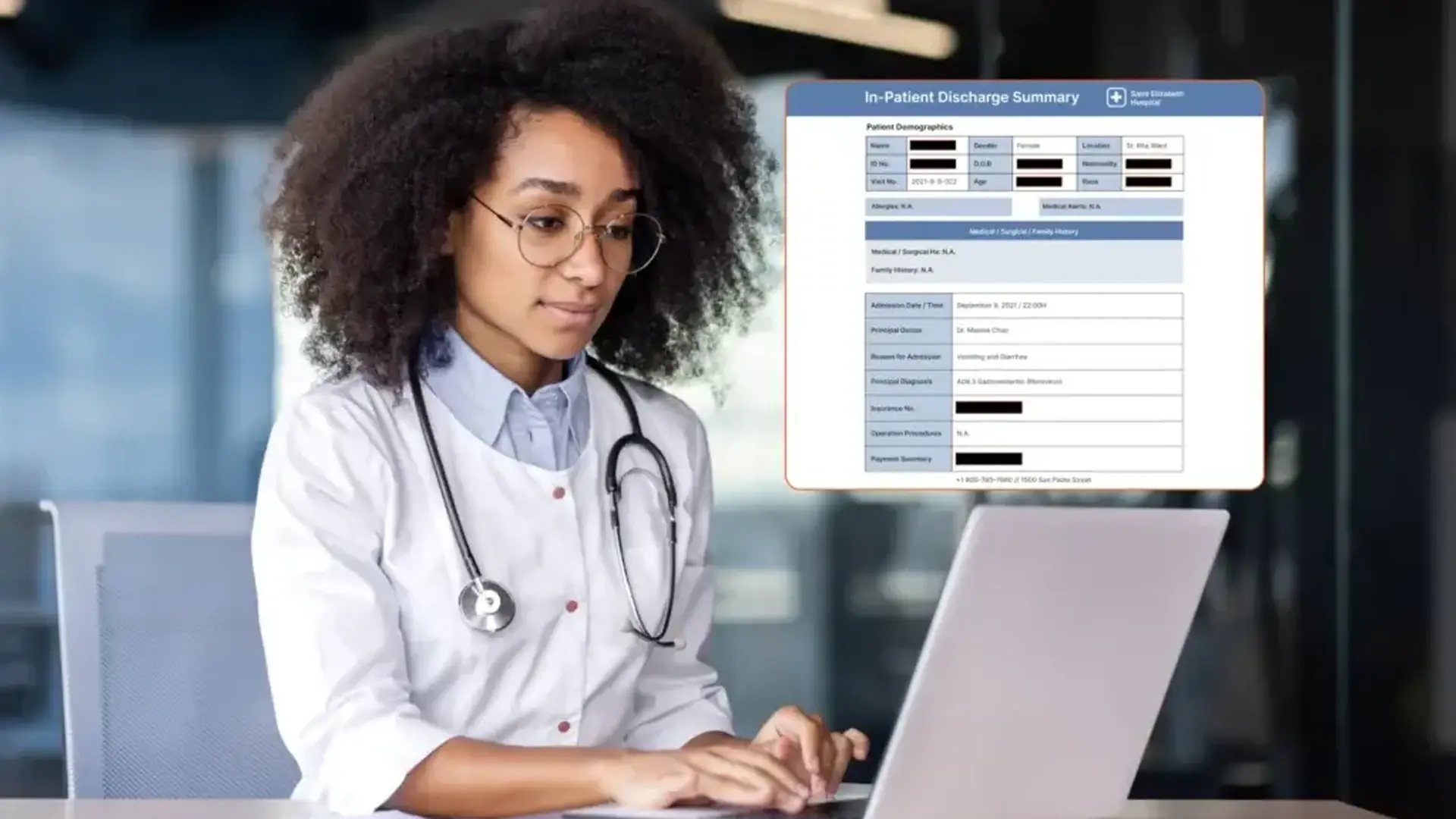Preventing Medical Identity Theft with HIPAA Redaction Software
by Malaika Batool, Last updated: December 11, 2024

HIPAA redaction software safeguards patient privacy by removing sensitive information, preventing identity theft, and ensuring compliance. Learn more about how it protects patient data.
Imagine your medical records, with every detail about your health history, falling into the wrong hands. Evelyn Miller was surprised to receive a call from Emory University Hospital in Atlanta informing her about her wait time to see the doctor. She no longer lived in Atlanta, so how could she visit a healthcare facility there? A few weeks later, she was billed $3,600 for healthcare services.
Unfortunately, this is a reality for nearly 1.5 million Americans who fall victim to medical identity theft each year. Worse, tens of millions of medical records are leaked every year. The consequences of such breaches are far-reaching and severe.
The impact of medical identity theft extends beyond just the individual. It also presents serious risks for healthcare facilities. Patients may experience service denials, fall victim to insurance fraud, and suffer from privacy breaches. At the same time, healthcare providers could face regulatory violations, treatment disruptions, and significant expenses related to record recovery and legal proceedings. According to research, the average cost to fix medical identity theft for a single victim is $20,000 per incident. Now, figure out the cost you need to bear for millions of victims.
Healthcare facilities can significantly reduce the risk of the above devastating outcomes by leveraging HIPAA redaction software. This software protects sensitive patient information and ensures compliance with strict regulatory standards, safeguarding both the patient’s trust and the facility's reputation.
In this blog, we'll explore how HIPAA redaction software is crucial in preventing medical identity theft and why it's essential for maintaining the integrity and security of healthcare data.
The Growing Threat of Medical Identity Theft
Medical identity theft occurs when someone steals or uses a patient’s personal information, such as Social Security Number (SSN) or health insurance details, to submit fraudulent claims or obtain medical services without the patient’s consent. In 2023 alone, nearly 133 million patient records in the US healthcare sector were compromised. Hence, protecting patient privacy is crucial to reducing the impact of such breaches.
Criminals exploit stolen identities in several ways, including receiving medical treatments, tampering with records to conceal crimes, accessing unauthorized healthcare benefits, and using others' medical information to gain employment in healthcare settings. Each type of fraud presents specific risks, highlighting the importance of protecting patient privacy.
Ways Stolen Medical Identities Are Exploited
Once medical identities are stolen, they can be exploited in various ways, posing significant risks to individuals and healthcare organizations. Therefore, understanding these methods is crucial for effectively protecting patient privacy. The following are some of the ways in which stolen medical identities are exploited:
Selling Protected Health Information (PHI)
Stolen medical identities are often sold on the dark web. According to CNBC, medical records are sold cheaply at $60, making it affordable for all cybercriminals. However, this data is precious for committing various fraudulent activities. For example, hackers recently published extensive patient information from Leon Medical Centers, Miami, and Nocona General Hospital, Texas, posting tens of thousands of records on the dark web to extort these hospitals for money.
Fraudulent Billing Practices
Criminals frequently use stolen medical identities in fraudulent billing schemes, submitting false claims to insurance companies for services they never provided. For instance, authorities sentenced a New York man, Mathew James, to 12 years in prison for defrauding insurance companies out of over $336 million by manipulating billing practices with the help of physicians.
Accessing Unauthorized Health Benefits
Another common exploitation of stolen medical identities involves accessing unauthorized health benefits. Infiltrators use stolen identities to obtain medical treatments or surgeries, leading to unwarranted medical bills for the victims. This fraud also risks the victim's health due to inaccurate medical histories.
Prescription Abuse
Criminals may use stolen information to obtain prescription drugs, which can then be sold illegally or abused by the perpetrator. A pharmacy owner named Irina Sadovsky, and her associate were sentenced for submitting fraudulent claims to Medicare and Medi-Cal and engaging in a black market for prescription drugs.
Employment Fraud
Stolen medical identities can also be used for employment fraud. Individuals may use another person’s medical records to pass health screenings or to gain employment in healthcare settings.
Understanding HIPAA Redaction
The Health Insurance Portability and Accountability Act (HIPAA) is a critical framework that ensures Protected Health Information (PHI) remains secure when shared with third parties. HIPAA redaction involves removing or obscuring specific data underlined by the act to protect sensitive information from unauthorized access and stay compliant.
This rule requires the elimination of 18 specific identifiers from medical records, ensuring the data cannot be traced back to the individual. This ensures that medical records are protected, and medical identity theft is prevented even in case of data breaches.
Moreover, HIPAA redaction is essential for healthcare providers and insurers to comply with federal regulations and avoid potential violations. By redacting medical records, they can protect sensitive information while sharing necessary data, making it harder for criminals to exploit PHI for identity theft.
Given the time-consuming nature of manual redaction, many organizations are transitioning to HIPAA-compliant software solutions. These tools streamline the HIPAA redaction process, ensuring that healthcare facilities maintain the highest privacy and security standards, ultimately safeguarding against the growing threat of medical identity theft.
18 Identifiers Under HIPAA
As stated above, HIPAA outlines 18 identifiers that must be redacted to protect patients' privacy. These identifiers are considered Protected Health Information (PHI) and must be obscured to ensure patient confidentiality. Below are the 18 identifiers:
.webp?width=1080&height=1080&name=18-Identifiers-Under-HIPAA%20(1).webp)
- Patient names
- Geographical elements (addresses, cities, countries, and zip codes)
- Dates related to health (admission, discharge, birth and death dates, age-related dates)
- Telephone numbers
- Fax numbers
- Email addresses
- Social Security Numbers (SSNs)
- Medical record numbers
- Health insurance beneficiary numbers
- Account numbers
- Certificate/License numbers
- Vehicle identifiers (License plates)
- Device attributes or serial numbers
- Digital identifiers (URLs or web addresses)
- IP addresses
- Biometric elements (Fingerprints, retinal scans, and voiceprints)
- Full-face photographs
- Other identifying numbers or codes.
How HIPAA Redaction Software Helps Prevent Identity Theft
HIPAA redaction software is crucial in combating medical identity theft by intelligently hiding sensitive information. This technology ensures that Protected Health Information (PHI) is not accessible to unauthorized individuals, reducing the risk of identity theft. The following are some of the ways in which HIPAA redaction software helps prevent medical identity theft:
Securing Sensitive Information
HIPAA redaction software is designed to automatically detect and redact Personally Identifiable Information (PII) such as names, addresses, and Social Security numbers. Features like automated redaction and pattern redaction ensure convenience for health professionals when redacting medical records.
Also, Optical Character Recognition (OCR) redaction allows the software to redact text in scanned documents and images, safeguarding all Protected Health Information (PHI) forms from unauthorized access.
Mitigating Risks of Data Breaches
With 88% of office-based physicians and 81.2% of hospitals using Electronic Health Records (EHR), the risk of data breaches has grown significantly. According to the Office of Civil Rights Director, Melanie Fontes Rainer:
"Data breaches caused by current and former workforce members impermissibly accessing patient records are a recurring issue across the healthcare industry."
HIPAA redaction software plays a crucial role in reducing the chances of data breaches by securing sensitive patient information. Integrating such redaction software into EHR systems ensures that Protected Health Information (PHI) remains secure, even if unauthorized individuals gain access.
Streamlining the Redaction Process
Moreover, HIPAA redaction software makes the process more efficient and less time-consuming. Custom redaction rules allow organizations to create specific redaction protocols using regular expressions tailored to their unique needs.
Moreover, features such as bulk redaction enable the simultaneous redaction of multiple documents, while secure automated workflow ensures that redaction processes are always active.
Additionally, audit trails further enhance security by maintaining comprehensive logs of all redaction activities, making it harder for cybercriminals to exploit sensitive data and commit medical identity theft.
Benefits of Using HIPAA Redaction Software to Prevent Medical Data Breaches
As established, protecting patient information is more critical than ever in today's healthcare environment, especially with the rising threat of medical identity theft. HIPAA redaction software offers a comprehensive solution that safeguards sensitive data and benefits healthcare facilities.
.webp?width=1080&height=1080&name=Benefits-of-Using-HIPAA-Redaction-in-Healthcare-Industry%20(1).webp)
Ensuring Compliance
HIPAA redaction software helps healthcare facilities comply with federal regulations by securely removing sensitive information from documents. This compliance is critical in preventing medical identity theft and avoiding legal penalties.
Ensuring Privacy
By automatically detecting and redacting medical records, the software ensures patient privacy, reducing the risk of unauthorized access to such information to prevent identity theft. This protection is essential for maintaining the confidentiality of patient data.
Preventing Financial Burdens
Medical identity theft can lead to significant financial losses in data breach settlements, system upgradation, and lost goodwill. For instance, Maryland-based Atlantic General Hospital reached a $2.25 million settlement after the personal and medical information of 30,000 individuals was compromised.
HIPAA redaction software is crucial in preventing these financial burdens by effectively redacting sensitive information. Despite data breaches, redaction can significantly reduce the likelihood of lawsuits against healthcare units for violating patients' privacy.
Enhanced Trust
When patients know their information is securely protected, trust in the healthcare facility is built. This trust is crucial for maintaining strong patient relationships and ensuring patients feel safe sharing their information. This also improves the overall reputation of the hospitals.
Improved Patient Satisfaction
Adequate data protection through HIPAA redaction software leads to higher patient satisfaction. Patients appreciate knowing their information is secure, contributing to a positive experience with the healthcare provider.
Conclusion
Given the apparent high risks of medical identity theft, HIPAA redaction is pivotal in reducing its impact by ensuring that sensitive patient information remains secure and inaccessible to unauthorized individuals. By implementing HIPAA redaction software, healthcare facilities can achieve compliance with federal regulations, significantly reduce the risk of data breaches, and enhance patient trust.
The benefits are clear: protecting patient privacy, avoiding financial and legal repercussions, and maintaining the integrity of healthcare services. As threats to patient data continue to grow, adopting HIPAA redaction software is not just a precaution—it's an essential step in safeguarding patient data and healthcare facilities' reputations. Prioritizing the security of patient information is critical in today's digital age, and HIPAA redaction software is a powerful tool in this ongoing effort.
People Also Ask
What is HIPAA redaction software?
HIPAA redaction software removes sensitive information, such as patient names and medical details, from documents to ensure compliance with regulations. By automating this process, it minimizes human error and protects protected health information (PHI). This ensures that healthcare providers and organizations handle data securely and maintain patient privacy.
How does HIPAA redaction software help prevent medical identity theft?
HIPAA redaction software prevents medical identity theft by automatically detecting and redacting personally identifiable information (PII) in medical records. This ensures that even if a data breach occurs, the redacted information remains secure. As a result, cybercriminals cannot exploit the information for identity theft.
What are the common ways medical identity theft occurs in healthcare?
Medical identity theft occurs in many ways. These include data breaches, insider attacks, and phishing scams. Friendly fraud, where someone uses a friend’s or relative’s insurance card, is also common. Stolen medical identities can be exploited for fraudulent billing practices, accessing unauthorized health benefits, or prescription abuse.
Why is it necessary for healthcare facilities to use HIPAA redaction software?
Healthcare facilities must use HIPAA redaction software to ensure compliance with federal regulations, protect patient privacy, prevent financial losses from identity theft, and maintain trust with patients. The software streamlines the redaction process, making it more efficient and reducing the risk of human error.
Can HIPAA redaction software handle large volumes of data efficiently?
Yes, HIPAA redaction software is designed to handle large volumes of data efficiently. It includes features like bulk redaction and secure automated workflows, which allow healthcare facilities to redact multiple documents simultaneously and maintain high standards of privacy and security without delay.
Jump to
You May Also Like
These Related Stories

The Difference Between Redaction and Privacy Masking

How Insurance Firms Streamline Compliance with AI Redaction Tools


No Comments Yet
Let us know what you think